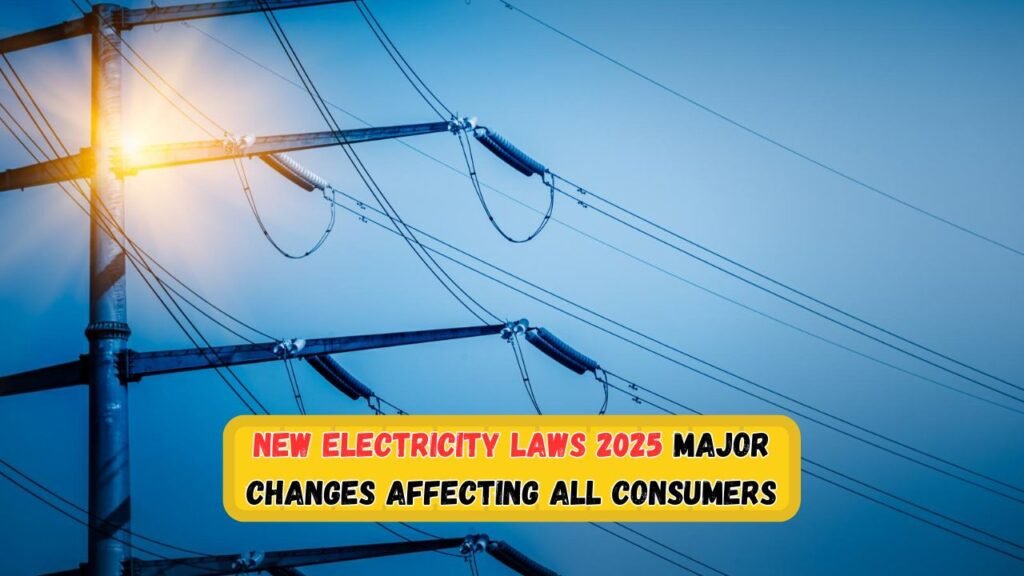Major 2025 Electricity Law Changes in South Africa: South Africa is on the brink of significant transformation with the upcoming electricity law changes scheduled for 2025. These changes are expected to impact every household across the nation, addressing the long-standing energy challenges that have plagued the country. The new legislation aims to increase efficiency, promote renewable energy sources, and ensure a more reliable supply of electricity. As South Africa continues to face energy shortages, these reforms are seen as a crucial step toward a sustainable future. With a focus on modernising the grid and integrating alternative energy solutions, the 2025 electricity law changes are set to redefine the way South Africans consume and generate power.

Understanding the 2025 Electricity Law Overhaul
The 2025 electricity law overhaul in South Africa is a comprehensive reform designed to address the pressing energy issues faced by the nation. This legislative change focuses on several key areas, including infrastructure development, increased use of renewable energy, and improved regulatory frameworks. The new laws aim to modernise South Africa’s electricity grid, making it more resilient and capable of integrating various energy sources. By prioritising renewable energy, the government hopes to reduce the country’s reliance on fossil fuels, thereby decreasing carbon emissions and supporting global climate goals. Additionally, the overhaul includes measures to enhance transparency and competition within the energy sector, fostering innovation and driving down costs for consumers. These changes are pivotal for South Africa as they promise not only to resolve current energy crises but also to pave the way for a greener and more sustainable energy future.
Renewable Energy at the Forefront of South Africa’s Energy Transition
Renewable energy is set to play a central role in South Africa’s energy transition as part of the 2025 electricity law changes. The country has abundant natural resources that can be harnessed for sustainable energy production, including solar, wind, and hydroelectric power. The new laws provide incentives for the development and integration of these renewable sources into the national grid. By embracing clean energy, South Africa aims to reduce its carbon footprint significantly while creating new economic opportunities in the green energy sector. The government’s commitment to renewable energy is reflected in plans to expand solar and wind farms, increase investment in green technologies, and support research and development initiatives. This shift is expected to lead to job creation, economic growth, and a more sustainable energy landscape, positioning South Africa as a leader in renewable energy within the African continent.
Impact of 2025 Electricity Reforms on South African Households
The impact of the 2025 electricity reforms on South African households will be profound, affecting everything from energy consumption patterns to electricity costs. With the introduction of more efficient and reliable energy supply systems, households can expect fewer power outages and more stable electricity services. The shift towards renewable energy sources is also likely to result in cost savings for consumers in the long run, as the reliance on expensive fossil fuels decreases. Additionally, the new regulations may encourage households to adopt energy-efficient practices and technologies, such as solar panels and energy-saving appliances. This not only contributes to reducing individual carbon footprints but also helps in lowering overall energy bills. The reforms are designed to empower consumers by providing more choices and greater control over their energy use, ultimately fostering a more sustainable and cost-effective energy environment for all South Africans.
Challenges and Opportunities of Implementing the New Electricity Laws
Implementing the new electricity laws in South Africa presents both challenges and opportunities. One of the primary challenges is the need for substantial investment in infrastructure to support the transition to a modernised and renewable energy-focused grid. This requires collaboration between the government, private sector, and international partners to secure the necessary funding and expertise. Additionally, there may be resistance from stakeholders who benefit from the current energy system, necessitating effective communication and engagement strategies to ensure a smooth transition. On the opportunity side, the reforms present a chance to stimulate economic growth by attracting investment in the renewable energy sector, creating jobs, and driving technological innovation. Moreover, successful implementation of the new laws will enhance South Africa’s energy security, reduce environmental impact, and position the country as a leader in sustainable energy practices. By overcoming the challenges and capitalising on the opportunities, South Africa can achieve a more resilient and sustainable energy future, benefitting both the economy and the environment.


